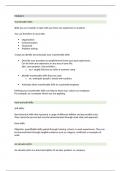Module 0
Transferable skills:
Skills you can transfer or take with you from one experience to another.
You can find them in areas like:
Organization
Communication
Teamwork
Problem solving
3 steps to identify and articulate your transferable skills:
Describe your proudest accomplishments from your past experiences.
Can be from any experience in any area of your life:
jobs, class projects, club activities,…
o ex: I taught kids how to swim at summer camp
Identify transferable skills that you used
o ex: anticipate people’s needs and reactions
Articulate those transferable skills to a potential employer
Defining your transferable skills can help to show your value to an employer.
For example, at a company where you are applying.
Hard and soft skills:
Soft Skills:
Non-technical skills that represent a range of different abilities and personality traits.
They cannot be proven but must be demonstrated through work style and approach.
Hard skills:
Objective, quantifiable skills gained through training, school, or work experiences. They can
be demonstrated through tangible evidence such as a degree, certificate or examples of
work.
An elevator pitch:
An elevator pitch is a short description of an idea, product, or company.
, Module 1
Human capital
Human capital is the economic value of skills and experiences of employees in a company,
such as communication skills, education, technical skills, creativity, problem-solving skills,
mental health, personal resilience and so on. They are intangible assets that can't be listed
on a company's balance sheet. The more a company invests in this, the better the company's
results will be (increases productivity and thus profitability).
How human capital can be stimulated:
Human capital can be improved by investing in the training, education, and benefits of
employees. For example you can give rewards, arrange meetings to follow them up and ask
how everything is going, arrange team buildings,…
Is it a useful concept:
Yes, I think it’s a useful concept because investing in human capital can lead to increases in
innovation, social well-being, equality, productivity and so on. This is not only positive for the
personal development of individuals, but also for the results of companies and thus
economic growth.
Why can it be criticized:
The criticism states that human capital is seen as selfish and exploitative.
The system ignores that some people are advantaged, and some people are disadvantaged.
I disagree. In my opinion, investing in human capital can create a lot of benefits if done in the
right way, without turning it into a competition, for example.




